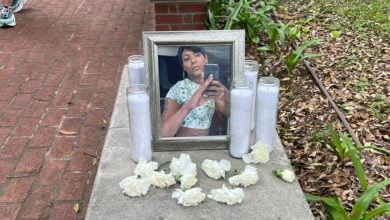
On April 19, 22 organizations representing social justice, LGBTQ, HIV, medical and social service organizations and one individual filed an amicus brief, a document that is prepared by representatives, interested parties and experts. The brief addresses the topic of HIV and social justice and opposes Missouri’s unjust HIV criminalization laws. They are doing so in the interest of invalidating
Michael Johnson’s 2015 conviction and 30.5 year sentence for allegedly intentionally transmitting the virus to a sex partner.
Michael Johnson, a young African American gay man living with HIV, is soft spoken and sincere in his attitude about his own infection. He is not exactly sure who could have infected him, but unlike the state of Missouri, Johnson says “I wouldn’t wish harm on anyone” and refuses to make any accusations.
The vilification and criminalization of disease is only possible in the most polarized society—one which contains the most significant scientific advances coupled with the most backwards and racist ideologies.
The coming together of this coalition of groups (see list below) is a significant step in overturning HIV criminalization laws that exist in 32 states–blaming those who are infected with the virus for its continued spread rather than the system that perpetuates racism, stigma, health disparities and hysteria, where access to health and disease prevention is a privilege, not a right.
“As you can see from The Positive Justice Project’s Consensus Statement on the Criminalization of HIV in the United States, released in July 2012, a number of these organizations have been involved in the movement to modernize HIV criminal laws,” Mayo Schreiber, Deputy Director of The Center for HIV Law and Policy, told Liberation News.
“This group of amici, however, underscores the ever increasing participation of a broad cross-section of local and national organizations, with varying perspectives and interests, who agree that HIV exposure and transmission laws are fundamentally unjust, do not work in reducing the spread of HIV, are counter-productive to public health efforts, increase stigma and are discriminatory against African-Americans and other members of our society,” said Schreiber.
Schreiber went on to challenge the state’s definition of intent when applied to an infectious disease–a disease with an extremely low transmission rate when precautions and treatment are available: “Missouri’s HIV exposure or transmission statute, however, does not take any account of what the person intended by their action. In essence, it is a ‘strict liability’ statute. The statute only requires that a person is HIV positive and knew it, the person had sex with another, and the person did not disclose their HIV positive status before the sex. There is no requirement that the person had the specific intent to infect another person, to cause them any harm, or even acted in a reckless manner (even though the statute misleadingly uses that term).
Racism, homophobia central to unjust laws
“The racist aspects of the media coverage of the case were glaringly apparent. Many of the photographs of Mr. Johnson, a college student and star athlete, focused on his upper torso, often without a shirt, objectifying him as hypersexual Black man, which has significant historical racist connotations,” commented Schreiber when asked to make comparisons to historical examples where racism and sexuality were apparent like the murder of Emmett Till and case of the Scottsboro 9.
“Missouri’s law, like many similar statutes, was passed at a time of ‘near hysteria in certain quarters.’ This statue was originally passed in 1988. If you recall, two years earlier, even in the esteemed New York Times, William Buckley, in an op-ed piece, stated ‘[e]veryone detected with AIDS should be tattooed in the upper forearm, to protect common-needle users, and on the buttocks, to prevent the victimization of other homosexuals.’ At the same time there were calls for people living with HIV to be quarantined,” explained Schreiber.
This divisive narrative where there are those who are guilty and those who are innocent in relation to disease fueled the flames of racism and homophobia right up until the closing arguments in Michael Johnson’s case. Prosecutor Phillip Groenweghe said unlike other cases of murder, HIV could wind up killing someone who never met Johnson “and who might not even be gay.”
“One of the men he [Johnson] had sex with didn’t want to come forward because he didn’t want to tell his wife. We’re all in this together. That’s why this is a crime. That’s why our legislature decided to make it a crime,” described Schreiber of the hysteria and fear that dominated the Missouri courtroom during Johnson’s trial.
The Positive Justice Project is one coalition that people can support in efforts to decriminalize HIV, but Schreiber encourages individual acts of organizing: “Follow The Center for HIV Law and Policy on Twitter @CtrHIVLawPolicy and Instagram @hiv_law_policy. Post, RT and Snap using #decriminalizehiv! Contact news sources—TV stations, newspapers, and magazines—to educate them on HIV criminalization and how inaccurate, sensationalized reporting promotes HIV stigma. Host a community educational event. Speak out when you learn someone is being prosecuted under a HIV criminal law.”
Michael Johnson may need funds either to get himself established outside of prison or in support of further litigation. Currently, he needs support for basic necessities, including food, toiletries and telephone access. People can help him by establishing an account at www.accesscorrections.com and making a donation to him.
Coalition members:
· AIDS Law Project of Pennsylvania
· American Academy of HIV Medicine
· American Civil Liberties Union of Missouri Foundation
· Athlete Ally
· Black AIDS Institute
· Center for Constitutional Rights
· Center for HIV Law and Policy
· Counter Narrative Project
· Dr. Jeffrey Birnbaum
· Empower Missouri
· GLBTQ Legal Advocates & Defenders
· GLMA: Health Professionals Advancing LGBT Equality
· Grace
· Human Rights Campaign
· Missouri AIDS Task Force
· National Alliance of State and Territorial AIDS Directors
· National Black Justice Coalition
· National Center for Lesbian Rights
· National LGBTQ Task Force
· One Struggle KC
· Treatment Action Group
· William Way LGBT Community Center
· Women With A Vision





